2020 Department Awards
EML Students Recognized
Although we were unable to hold our annual Student Awards Reception due to COVID-19, we are proud to recognize the outstanding work our students have done this year. Here are this year's awardees, along with what we wish we could have said to them in person, in the presence of their family and friends:
EML Student of the Year

Rebekah Paerels, presented by Dr. Olga Griswold
CLASS Valedictorian
English Applied Language Studies Major Award
French Minor Award
The Department of English & Modern Languages introduces Ms. Rebekah Paerels as this year’s Outstanding Student in Applied Language Studies and an overall Outstanding Student for the Department. Rebekah’s accomplishments are, indeed, remarkable and uniquely deserving of this award. Not only has she maintained a perfect GPA during 4 years at CPP and in the Department, but she is also graduating with two minors in addition to her major in Applied Language Studies: French and Writing Studies.
An emerging scholar of exceptional caliber, Rebekah has completed a pioneering study in the productivity of English derivational morphology, exploring the phonological and morphological factors underlying the choice of suffixes in verb formation. This project was initially designed to be her Honors and Applied Language Studies Capstone work, and as such, it promised to be excellent. But it has exceeded all expectations. Its quality is above and beyond what one might see even in the most excellent undergraduate thesis. Rebekah’s work explored the aspects of linguistic productivity that have not yet been adequately addressed to any extent in linguistic literature. Her study is of publishable quality, and she will be pursuing its development and publication as she heads to graduate school. In the meantime, her project has been accepted for presentation at both Kellogg Honors Convocation and the Undergraduate Research and Creative Activity Showcase.
And speaking of graduate school, Rebekah is planning on pursuing a Master’s in Linguistics in the fall of 2020. She has not yet decided on a specific career path in Linguistics, and in graduate school, she is looking forward to exploring all and any of her options that foster her love of language. Rebekah is, without a doubt, a true lover of language. Not only did she excel in learning French at Cal Poly, but in the summer of 2019, she spent a month at the University of Ulsan in Korea, studying the Korean language and culture. Her experience has spurred her to consider returning to Korea in the future as a language teacher, and she is absolutely certain to make an excellent one.
Many of us have had Rebekah in our classes over the years. And in each class, she has been a critical thinker, and active participant, and a superb peer mentor to her classmates. Her keen analytical mind, her eloquent and concise writing style, her amiability, and her goal orientation and perseverance have made it a pleasure to have Rebekah as a student.
Rebekah is not only an excellent student and scholar, though. She is a passionate, active, engaged individual. She is finishing her senior year balancing a myriad of activities. Not only is she the captain of one of the CPP’s Roller Hockey teams and the Roller Hockey Club Vice President, but also a Lead Tutor at the University Writing Center and a Global Ambassador for the International Center.
English Education Major & TESOL Minor Awards
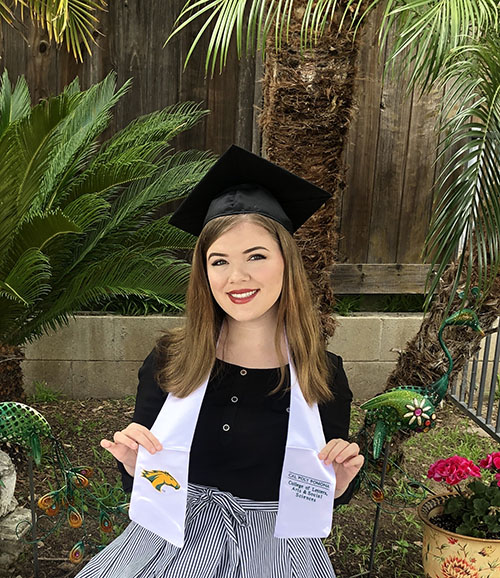
Katelyn Porter, presented by Dr. Alison Baker
Katelyn Porter is a born educator. She is a self-reflective tutor and classroom aid, with experience teaching English in China, because she is as much an autodidact as an excellent student. Her years of meeting her instructors more than halfway are a result of her need to understand how she’s learning and how she can learn better, so she is already well on her way to becoming an outstanding secondary teacher.
Katelyn has an impressive academic record: she is certified bilingual in French, has maintained Dean’s and President’s List honors throughout her university career, and is a graduate of the Kellogg Honors College. She has published poetry in Harvest International, and had her senior thesis accepted to present her research at the URCAS conference. And her senior project reflects these two strengths and interests as well, being an analysis and application of Edmund Spenser’s poetics. Katelyn has abstracted Spenserian values and practices and used them to produce a Book in continuation of Spenser’s unfinished masterpiece, The Faerie Queene. In short, she is an academic rock star.
But what tells me about the kind of teacher she will be is not in her resume. After having Katelyn in four classes and talking with her for many hours of research and creative work, I can tell you she is the kind of student who adds to the success of every class she takes. She asks questions that start conversations. She supports other students as they work together to master content. She seeks out ways to deepen her understanding, to connect what she’s learning to what she already knows, and to move herself forward more than any individual instructor could have done.
And she does all this with a compassionate heart and genuine interest in becoming and helping others to become their best selves. She champions diversity and promotes equity through education and literacy. She is, like her Spenserian protagonist, a warrior in defense of kindness. She is a wonderful human being and has already begun to make the world a better place.
I am grateful to have the opportunity to recognize Katelyn and her accomplishments, and I look forward to watching what grows where she chooses to shine her prodigious light next.
Congratulations and all best wishes, Katelyn.
English Literature Major Award

Lydia Nolte, presented by Dr. Liam Corley
Lydia transferred to Cal Poly from Mount San Antonio College in 2017 and immediately began impressing instructors with her strong writing skills and independent mind. Lydia enrolled in my upper-division Early American Literature course during her first year at Cal Poly and demonstrated the intellectual poise that all of us in the department have come to expect from her. What most impressed me about Lydia was how she disciplined herself to develop her research ideas over time. She gave herself the space to absorb research and change her ideas. More than anything else, this showed me Lydia had the heart of a true scholar, someone who pursues ideas and their consequences.
I have also had the good fortune of observing Ms. Nolte as a poet collaborator in two cycles of an extracurricular poetry workshop that I facilitate with Dr. DeRosa. As a poet, Lydia is daring, lush, and evocative. Her poems are both relentlessly personal and extraordinarily sophisticated in their use of cultural and historical contexts.
Lydia exemplifies what Chaucer describes as the ideal scholar, “And gladly wolde [s]he lerne and gladly teche.” I’ve appreciated many conversations with Lydia where she discussed the challenges and pleasures of tutoring and teaching. For her, study is intimately connected to real-life concerns. Hers is not a selfish pursuit of knowledge; rather, Lydia keeps the springs of knowledge fresh by using them to cultivate other minds.
Given all of Lydia’s skills, accomplishments, and promise, we are extremely gratified that she has chosen to continue her education by enrolling in the Master’s program in English here at Cal Poly. She is already making her mark in this new territory, and I anticipate with pleasure the ways Lydia will take her education beyond Cal Poly to serve as a light and encouragement to others.
Congratulations, Lydia! You inspire us all.
Spanish Major Awards
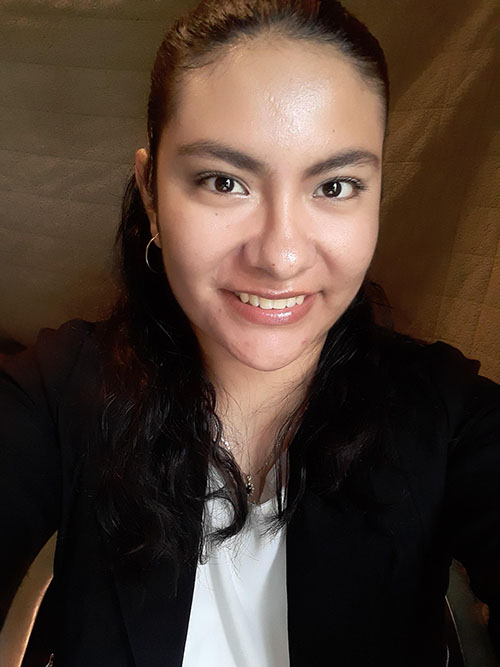
Leticia Chavez Gonzalez, presented by Dr. Marta Albalá-Pelegrín
Leticia Chavez Gonzalez is this year's Outstanding Student for the Spanish BA. En nombre del departamento ¡Felicitaciones! Being the first in her family to graduate with a BA, she is proud to be a role model for her family, especially for her siblings and cousins. Anyone who has had Leticia as a student will agree that she is an extremely brilliant student, a sharp and critical mind and an utter perfectionist. She has also had an important role in fostering the cultural and intellectual life of the campus and beyond. Since Fall 2019 Leticia acted as Fundraising chair for the Spanish Language Association and worked as a volunteer at Los Altos Elementary school. She is also the "poet laureate" of the Spanish Poetry class, having won the class's Poetic Tournament. "To escape reality she became part of the sea" reads the first line of the piece that won the hearts and votes of her peers, who deemed her poetry a delicately woven piece in which darkness and joy predominate.
After graduating, Leticia will take classes in the Teaching Credential Program at Cal Poly. Her ultimate goal is to become a teacher. She has lived in the States since she was a child, and she holds no visual memory of her hometown, Quiroga, in Michoacán, México, whose space she recreates trough the stories she has heard from her parents. Leticia feels studying Spanish helps her to reconnect with her Mexican roots, as well as to get an in-depth knowledge of the past and present histories of the different Spanish-speaking countries. She aims to inspire her future students with her curiosity and her love for the Spanish language and la belleza de la cultura hispana. Estamos seguros de que será una maestra fantástica.


Esther Holzmeister, presented by Dr. Isabel Bustamante-López
Esther Bigi-Holzmeister is a talented, hardworking, dedicated and highly motivated individual. Esther has dedicated most of her professional life to Early Childhood education. She has been a Special Education assistant and instructor at various private and public institutions.
She is also an author and artist and a mother to four boys. Esther has published First Day of School/El primer día de escuela, a children’s book. She wrote the text and designed the artwork to help parents and children to prepare for the first day of class. In her book, she captures the essence of a child’s anxiety and excitement of the first day of class. However, Esther’s dream was to finish her undergraduate studies.
Two years ago, Esther decided to apply for admission to Cal Poly Pomona. A few weeks later she received a letter stating that she had been admitted. She was so excited and so happy that she cried. She could not believe the news that she had received. Esther continued working at her preschool while beginning her studies at CPP. After work, she would drive to campus; on her way to classes, she would walk looking at the various buildings in disbelief. She finally was going to achieve her goal!
Even though Esther would arrive to her classes very tired, she would sit down and do her best to focus on her classes. She was always well prepared and ready to share her knowledge with her classmates. Esther worked extremely hard and as a result of her efforts, she excelled in all her classes. At Cal Poly Pomona she demonstrated her creativity conducting research, and writing papers on Hispanic literatures, Spanish linguistics as well as Latin American culture.
Esther says that she received much encouragement from her Spanish professors: Dr. Albalá, Dr. Bustamante, Dr. Contreras, Dr. Dickson, Dr. Llombart, and Dr. Hernández. She would like to especially thank them for their dedication, patience, and for motivating her to graduate at Cal Poly Pomona.
Next semester Esther will start her Master's degree in Languages, Literatures, and Cultures – Spanish Specialization at CSU Fullerton. She will most certainly become a successful graduate student!
Congratulations, Esther!
¡Felicitaciones y éxito en el futuro!
EML Recognition of Excellence
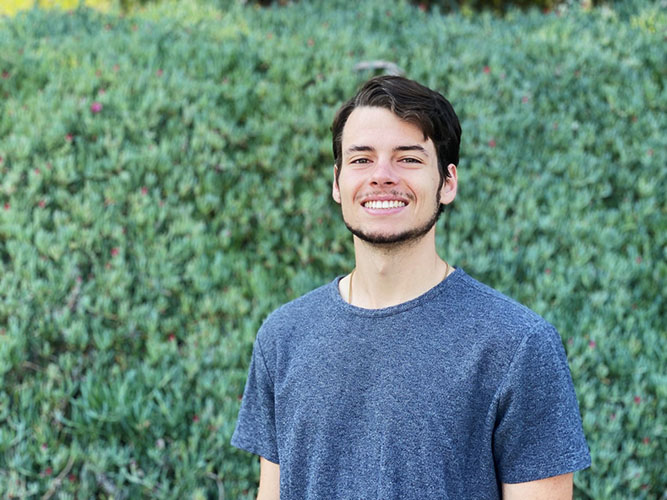
John Michael Murphy, presented by Dr. Sharon Hilles
The Recognition of Excellence Award is given to the student who demonstrates a genuine commitment to excellence in all areas: academic, social, and personal. These words provide a stunningly accurate description of this year’s award winner, John Michael Murphy.
John will be the first in his family to graduate from college and he will graduate Summa Cum Laude (with highest honors) with one of the best GPAs across the university. This comes as no surprise to any of his professors or his fellow students. John is intensely curious about everything he encounters, and he intentionally approaches all aspects of his life “fully interested”. This claim is borne out by his achievements in a variety of classes inside and outside of his major and even his choice of recreational reading: philosophy, economics, and politics. Early on at CPP John decided to change his major to English because he wanted “more of an academic challenge” and a major that would challenge him to live up to his potential. Initially, he said, he found the amount of reading required in English and Modern Languages a bit daunting. In fact, the first week he had a sore neck from reading so much, but he soon adapted and loves the Department, his professors, his fellow students, and the discipline.
John has been described as being “uncommonly decent” and “remarkably generous to his fellow students and to the faculty.” He is kind, ethical, and honest, and is committed to a life well-lived. He is generous in every sense of the word and treats his fellow students and professors with extraordinary courtesy and respect. He has a quick, wonderful sense of humor and is a highly sought-after group member. His professors say that he usually listens—intently—more than he speaks, but when he does speak, he exhibits a formidable intellect. One said, “He always asks interesting and probing questions that are obviously grounded in an impressive grasp of the topic.” John believes in outside reading. He also believes in sports. John was an athlete in high school (baseball and football) and he is currently an avid sports fan and runs cross country for fun. Training for a marathon may be in his future.
This summer, instead of laying flooring, John will be spending time with family and his girlfriend, making French Press coffee, preparing for his internship, and enjoying Irish Whiskey. He’ll also read some good books. In Fall he plans to work as an intern for CRU at CPP and to apply for graduate school. His long-term goal is to earn a PhD. His father’s advice when John started at CPP: “Stay in school and get a job where you use your brain so you don't have to labor and use your body." Clearly John has followed his father’s sage advice and we are so glad that he did. John’s presence here has touched everyone with whom he has come in contact and he is a most deserving recipient of the Recognition of Excellence Award.
Award for Multilingual & International Studies
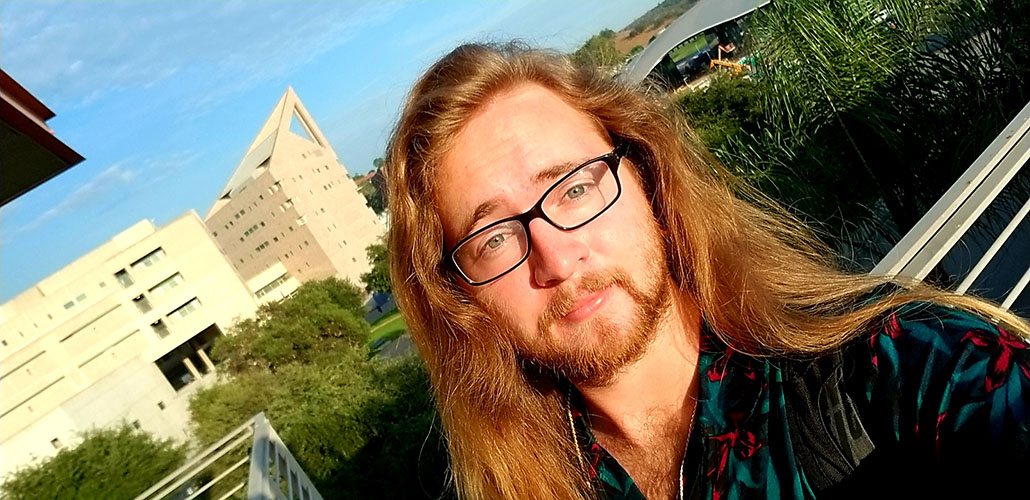
Austin L. White, presented by Dr. Amalia Llombart
The EML department at CPP is delighted and honored to award Austin White with the 2020 Multilingual and International Studies Award.
Austin White exemplifies the love for learning languages and embracing other cultures. Born and raised in Iowa, Austin grew up feeling jealous of friends who spoke another language and fascinated by the fact that someone could speak and understand more than one language. In middle school, after trying Spanish and French, Austin decided to study French for the next two years. Austin returned to learning Spanish in Des Moines Community College, where he was studying Computer Science. During that time, Austin enjoyed noticing not only the structural similarities and differences between Spanish, French, and English, but also the connections between those languages and computer programming languages, and, as he noticed, Yoda’s speech.
His motivation to learn Spanish made Austin take his efforts outside of the classroom and class-related assignments. Austin looked for every opportunity to develop his communication skills in Spanish, through movies, radio, books, … and also speaking Spanish with friends. A life-changing experience was his first trip to Chile, where Austin “truly fell in love with Spanish and of learning about other cultures, especially Latin American cultures.” At his return to Des Moines, Austin decided to change majors, and he switched from Computer Sciences to Spanish. When he returned to Chile two years later, he impressed his host family with his language growth. Being able now to totally immerse in the community helped, in turn, to jumpstart his language development and his knowledge and appreciation of culture.
In 2016, Austin moved to California and enrolled in Norco College, where he received an Associate Degree in Spanish, among others. When he transferred to Cal Poly Pomona, in 2018, he enrolled in the Spanish B.A. program, where he amazed all his professors with his passion and ability for learning other languages and cultures, reading literature, and his keen attention to the language structure and language idiosyncrasies. He is now planning to travel to Spain to teach English as a Second Language, and to teach Spanish or work in translation/interpretation upon his return. The doors will surely open to Austin wherever he goes.
Austin White truly is an example for those trying to learn another language. He reminds us all that learning another language is only possible when motivated by the desire to communicate with others and to immerse in other cultures, with curiosity an inquisitive mind and the ability to enjoy leaving your area of comfort.
Outstanding Minor Awards
Chinese

Lam T. Ngo
Spanish

Monserrat Coria

Sofía King
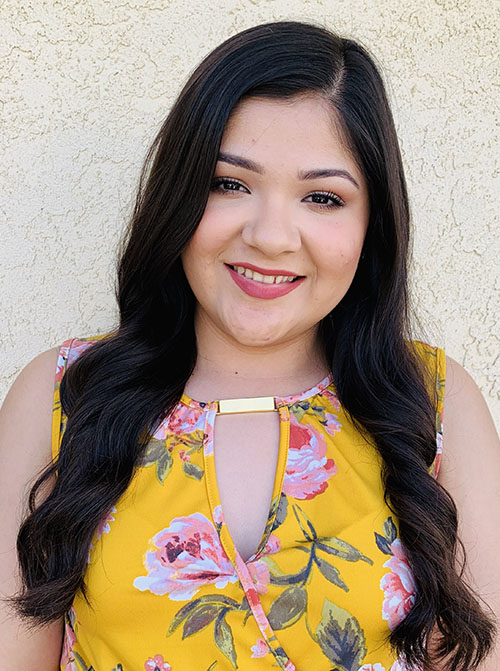
Viviana Piceno
Writing Studies
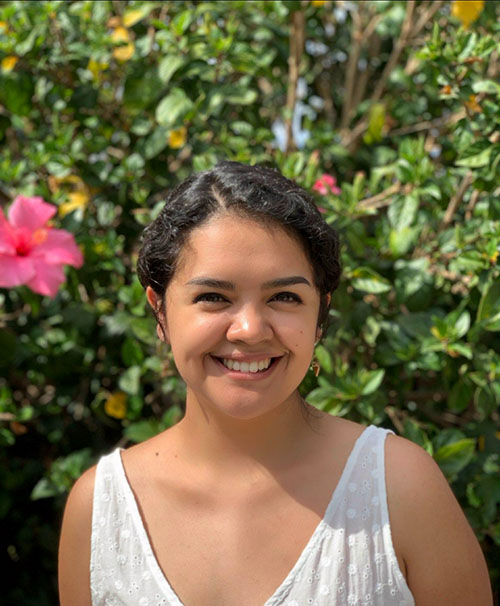
Jasmine Nevarez
Certificate in German Studies for the Professions Award
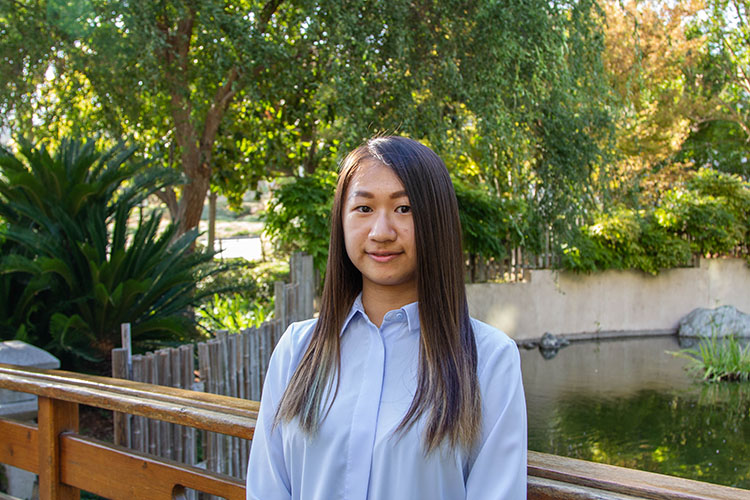
Jo Yee Tang
Outstanding English Graduate Student Awards
Literature
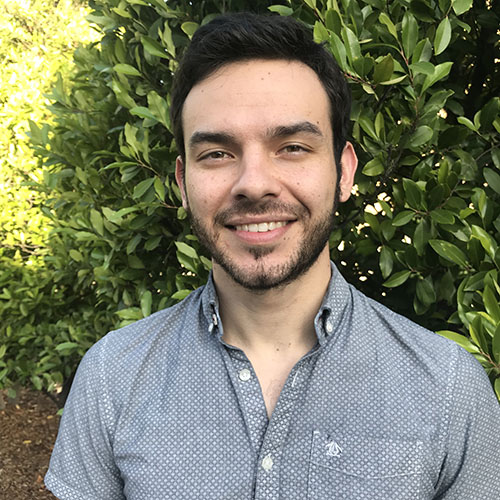
Ryan Brown, presented by Dr. Aaron DeRosa
With incredibly fierce competition this year, the faculty would like to congratulate Ryan Brown for his dedication to the program by co-awarding him as the Outstanding Graduate Student in Literature. Ryan is one of the most advanced students we’ve seen in the program, a true teacher-scholar whose exceptional engagement with the material as a student has led to exceptional pedagogy. As a scholar and writer, Ryan is adept at listening to multiple perspectives, synthesizing material, and providing innovative insights into the material. As a teacher, he is unimpeachable. When Ryan’s name was mentioned for the award, one colleague noted “he was the model teacher that we hope all our TAs become.” I responded by saying “he’s the model teacher that I want to become.” He is both reserved and warm, stoic and empathic. In my observation I wrote, “Your students are very fortunate to have you at the helm, and the discipline is better for having you as its representative.” For these reasons, I think the faculty are in agreement that he can pretty much write his ticket anywhere he’d like to go and I look forward to learning from him in the future.
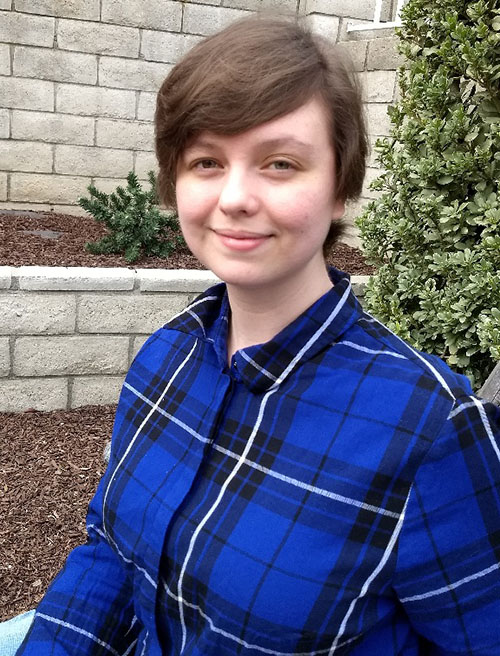
Alison Frances DeAlmeida, presented by Dr. Kate Ozment
I knew Alison’s name after our first class period. Even though I am a person who is terrible with names, she stuck with me. She’s the kind of classmate who makes a few apt comments that come back to nudge you as you drink your coffee the next day. When she speaks, other students listen a little closer and jot down a few notes. It’s subtle, but it’s one of the many reasons that Alison has stood out to us in the literature graduate program. She’s able to elevate the classroom discussion and brings a passion and energy into our space. She’s also a generous and kind peer reviewer who sees the best in what the work in progress represents rather than focusing on the negatives. It is perhaps this same attitude that has helped her succeed as writing tutor and build an editing business where she works with creative writers, game developers, and digital content. There is so many notable things to point out about how Alison has flourished during her time at CPP. She has a near-perfect GPA, routinely writes excellent seminar papers, frequently earned membership on the dean’s list as an undergrad, and formerly won the department’s outstanding undergraduate student in literature. But what stand out about Alison is the generosity of her thinking. She responds first with empathy and seeks to understand rather than critique. It is the kind of thinking we really could use more of, and we can’t wait to see what she does next. Congratulations, Alison!
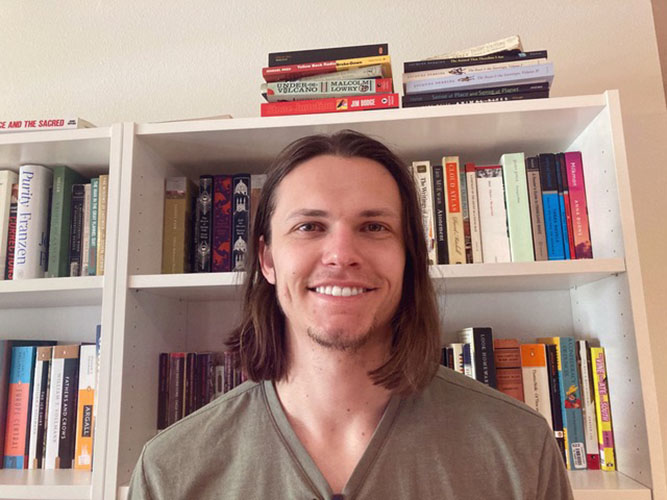
Patrick William Vincent, presented by Dr. Melissa Aaron
Patrick’s approach to literature is inspired. I had the pleasure of reading his essay on plant theory and gender in Early Modern revenge tragedy. His position on herbs, trees, suicide, and characters like Isabella and Ophelia is one of the most original I have ever seen, and it is hard to write something truly original about Hamlet. He plans further work as a Ph.D. student in animal studies, environmental criticism, and other biopolitical and posthuman issues. He is also selected to chair a panel on the Literature of Crisis and Apocalypse at the Pacific Modern Language Association. In addition, he has served as the Graduate Students in English Association (GradSEA) President and been an exceptional teaching associate (TA) in Literature teaching contemporary literature. I look forward to reading more work from him in environmental and animal studies, a much-needed branch of study.
Rhetoric & Composition
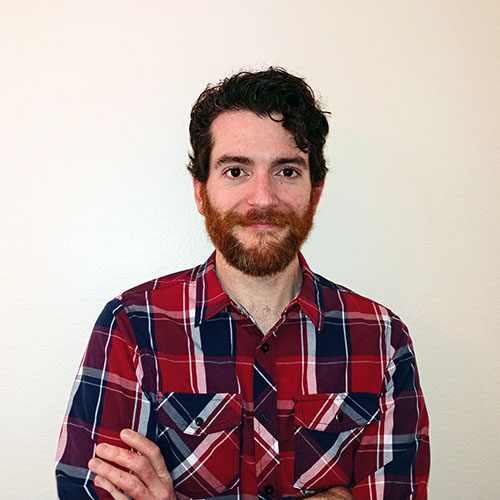
Geoffrey Huyck, presented by Dr. Donald Kraemer
A Teaching Associate and a Mentor TA, “a whip-smart joy,” awarded the highest score possible on his culminating Master’s Portfolio, good humored even when we mispronounced his name as “Joffrey”—Geoffrey has left the same favorable impression on all those in the Rhetoric & Composition program. In Geoffrey, we are honoring a student with uncommon intellectual liveliness, able both to synthesize new knowledge and to identify gaps and problems in his own work and then to find resourceful ways to address those. As one of his professors noted, “One of the great joys of having Geoffrey in class was his self-awareness: he knows what he’s adding to the conversation and what both the benefits and limitations of his lines of thinking and questioning are.” What’s noteworthy is that Geoffrey turned this capacity into something that helped his seminar-mates. As this professor continued, “This means that, even when he would come into class with something he definitely wanted us to focus on, he was incredibly receptive to other students’ needs—when following his line of thought wasn’t going to move the discussion in the most helpful direction, he would turn things in a direction better for the class as a whole.”
These seminar communities benefited as well from Geoffrey’s writing. Fellow students were unashamed in admitting they looked forward to reading his weekly blog posts, which from one seminar alone included reflections on “legitimate peripheral participation”; a Swiftian satire on the difference it would make, especially to students, if First-Year Composition classes were retitled with disciplinary prefixes (e.g., CHEM 101 instead of ENG 101); an essay on how a newswriting class was the best experience with getting meaningful feedback on his writing; a nuanced adjustment to Perelman’s notion of adherence, offered in the form of a continuum of adherence thresholds; an unpacking of the ambiguity in the literature on “transfer” and a case made for the “inert knowledge” metaphor, which Geoffrey advocated over another prominent model; a connection between Quintilian and the Holocaust’s expedient rhetoric of deliberation; and a model of the unachievable audience, hypothesized via Soliday’s Everyday Genres. In these posts and in discussion-board forums elsewhere, Geoffrey delivered beautifully composed mini-essays, any one of which would have warranted term-project-length treatment.
Our belief that Geoffrey will soon be making publishable contributions to Writing Studies was explicitly addressed by one of his professors: “In Cultural Rhetorics, Geoffrey researched the Mormon rhetorical tradition, research which also drew on his own religious background. He discovered that research on Mormon rhetorical traditions is sparse, and his was an important contribution to the growing body of scholarship on religious rhetorics. It is rare that one finds a seminar paper topic that makes a true contribution to a discipline, and it is more difficult to pull off such research in a manner that is promising for future publication.” It is rare to come across a student as promising as Geoffrey, whom it is our privilege to recognize as this year’s Outstanding Graduate Student in Rhet/Comp.
TESOL
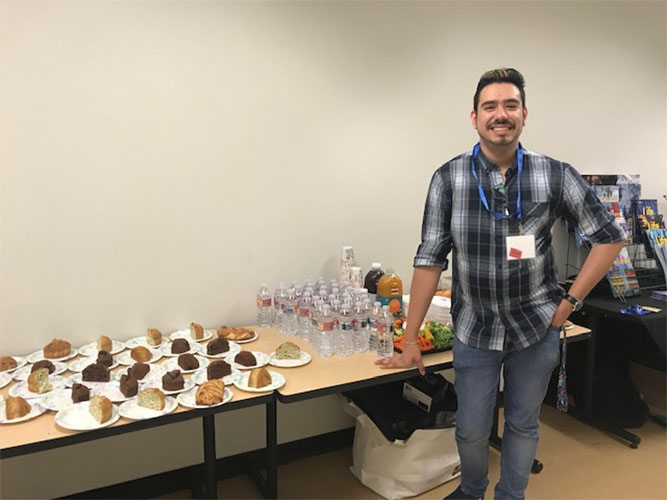
Marc Vincent Rodriguez, presented by Dr. Noel Houck
The EML Department is honoring Marc Rodriguez with the award for Outstanding Graduate Student in the Teaching English to Speakers of Other Languages (TESOL) program. This award is the well-earned result of a record of outstanding scholarly achievement. As an undergraduate English Education major, Marc distinguished himself in his classes, graduating Summa Cum Laude; as a graduate student, he continued to excel, again completing the program with the highest GPA.
Marc’s choice of a degree in English Education, followed by a single subject credential to teach high school in 2018, then a master’s degree in a specialized area of teaching should be no surprise. His family has always been involved in education. Even as an undergraduate, Marc was already employed at the Cal Poly English Language Institute (CPELI) as a classroom assistant, working alongside full-time ESL teachers to develop and apply lesson plans designed to strengthen reading and writing skills of ESL students learning.
As a graduate student Marc was intellectually self-propelled and engaged. His commitment to his studies shone through his work as he put 100% of his efforts into everything he did. In class, he brought his professionalism and dedication to the course content. He shared his ideas and experiences, all while making the words on the textbook pages come alive, taking the form of teaching strategies, classroom activities, lesson plans, and the like. Outside of the classroom, he promoted opportunities for collaboration with his classmates to discuss all things TESOL-related. Specifically, in Teaching American English Pronunciation, Marc engaged with a member of his community to provide evidence-based tutoring through the creation of high-quality materials on both segmentals and suprasegmentals. In another class, he reviewed articles on the effectiveness of video in teaching English as a foreign language in countries such as Saudi Arabia, Taiwan, Ecuador, and Iran, constructing a metric to evaluate the studies’ validity and reliability. He also worked on creating tailor-made materials for a learner of English who was training to become a pilot. And he played a significant role in the development of a class blog intended to provide pronunciation materials to a public audience.
In his second year of graduate study Marc was selected as one of four TESOL teaching associates (TA), teaching writing classes to multilingual freshmen. While TAs receive extensive mentoring, they are on their own in the classroom, developing rubrics and syllabi that align with CSU learning outcomes and creating assignments which take into consideration multilingual students’ learning needs and language proficiency levels. His mentor characterized him as a thoughtful, highly professional instructor, who took every opportunity to learn, and whose students rewarded him with frequent visits to his office hours.

Chi Vivian Tran, presented by Drs. Dewey Hall & Alyssa Kermad
Teaching English to speakers of other languages often can be exhilarating, as one interacts with a diverse group of students from various backgrounds, cultures, and languages. The classroom, in a sense, becomes a canvas, and the teacher becomes the artist with a variety of mediums to create a painting, featuring enriching learning experiences filled with vitality and warmth. Throughout her study as an English Education major, single-subject credential candidate, and graduate student in the TESOL option, Vivian Tran has been the budding young artist who has discovered that the art of teaching lies in one’s capability of blending approaches to reach a variety of students through meaning-centered instruction. The EML Department has selected her to be the co-awardee as the Outstanding Student in the Master of Arts TESOL program.
Evidently, Vivian recognizes that teaching and learning often constitute a reciprocal process. As a an undergraduate, she excelled as an English Education major becoming the Outstanding Student award recipient, as she delivered exemplary demonstration lessons at Ramona Junior High, where she enabled students to draw inferences from Sherwood Anderson’s “Departure” by deriving implicit meaning from the text. At the credential level, the hallmark of her pedagogy features her ability to modify lesson plans and spin learning environments into flipped classrooms—preparing instructional content online through YouTube to frontload learning—that she consistently delivered at Chino Hills High about Homer’s The Odyssey and Shakespeare’s Romeo and Juliet. Currently, as an eighth grade English teacher at South Pointe Middle School in the Walnut USD, Vivian’s multi-modal approach has been highly effective with English Language Development (ELD) students at levels 1, 2, and 3, motivating literacy learning through a safe classroom environment and positive rapport. At the graduate level in the TESOL MA program, Vivian has done stellar work. For example, in her graduate course on “Teaching American English Pronunciation,” Vivian maintains rigorous work and has participated in deploying a class blog, which makes pronunciation materials available to a public audience. Also, in this class, she has engaged in outreach with a member of her community to provide evidence-based pronunciation tutoring. She has also learned how to use speech visualization software to analyze second language pronunciation meticulously.
Anne Sullivan, the dedicated teacher of Helen Keller, once stated: “Education, in the light of present-day knowledge and need, calls for some spirited and creative innovations both in the substance and purpose of current pedagogy.” Anne, as governess to young Helen, is emblematic of “spirited” and “creative innovations” in her aim to teach a blind and deaf child understanding—the wonder and magnificence of meaningful communication through sign language. While Vivian is not Anne, she emulates her innovative teaching in “substance” (i.e., standards-based education) and “purpose” (i.e., student-centered instruction). Similar to Anne, Vivian Tran motivates children, especially ELD students, and undoubtedly will serve as an inspiring role model to make a positive impact in the lives of her students.
Ted Pugh Poetry Prize
Noah Gallego
Runner-up: Sarah Petras
Lillian Wilds Shakespeare Scholarship
Sarah Petras, presented by Drs. Melissa Aaron & Alyssa Kermad
The Scholarship we are about to award is named for Professor Lillian Wilds, who taught at Cal Poly Pomona for many years. Professor Wilds was a deeply admired teacher who, along with Joseph Stodder, now an emeritus professor, was a strong proponent of using a performance approach to explore the plays of Shakespeare and his contemporaries in the literature classroom. The Scholarship was established with funds donated by her son Daniel Wilds, as well as contributions from faculty and students who admired the work of Professor Wilds. Daniel and his wife, Linda, have been generous in adding to the endowment, so that the award, which was originally for $1,000, has been raised to $1,500. Daniel and Linda send their congratulations to the winner.
Previous winners of the Wilds Scholarship include Lloyd Aquino, Michelle Dougherty, Cynthia Greco, Bryan Nakawaki, Sarah Pawlak, Sarah Dassero, Amanda Riggle, Jill Walker, Mabel Schreffler, Ana Lina Garcia, and Vincent James T. Kirk.
We are delighted to announce the winner of this year's (2020) Lillian Wilds Shakespeare Scholarship: Sarah Petras.
Sarah graduated from Los Osos High School in 2017 with high honors and then joined Cal Poly Pomona (CPP) as an English Literature major and Theatre minor. Sarah is currently in her third year at CPP. With her outstanding GPA, Sarah has made the CPP President’s List for the last two years. Upon graduation from CPP, Sarah plans to continue to pursue her passion for literature via a graduate program which offers a specialization in her two major areas of interest: Shakespeare and Victorian literature. In a biographical note from Sarah, she writes that she has “only scratched the surface of what the Bard has to offer” and hopes to uncover much more in her graduate studies. Alongside her graduate studies in literature, Sarah intends to pursue a specialization in archival research. She elaborates on this with the following statement: “There is a certain life within the tangible text itself that I have always longed to explore, and especially with copies as old as Shakespeare’s folios, it is critical that work is done to preserve and study what might someday be lost to us. A recent dream of mine, in fact, has been to someday visit and possibly work at the Folger Shakespeare library, becoming one of the lucky few who get to work with the original folios themselves.”
After graduate school, Sarah hopes to model the examples of her CPP professors by becoming a college professor herself. In her own words, “I enjoy teaching, particularly in helping students achieve that ‘aha’ moment, and to get the opportunity to give others the same ‘aha’ moments that I received throughout my Bachelor’s education would be an honor.”
In addition to Sarah’s love of literature, she demonstrates great fervor of theatre. She has participated on stage in Shakespeare festivals and hopes to engage in performance or dramaturgy for a local Shakespeare company. It goes without saying that she also very much appreciates simply being an audience member of theatrical performances.
Sarah Petras’ great enthusiasm for the Bard spills into the very form of her essay, which was written entirely in blank verse. Her first experience with Shakespeare, reading the role of Julia from The Two Gentlemen of Verona, led to more theatre and an appreciation of Shakespeare’s female characters, which in turn led to a fascination with the language. She brings an experience we know ourselves:
The audiences long to hear these tales
In hopes this time, the end will be diff’rent
And Juliet and Romeo will live.
This observation—that Romeo and Juliet is a romantic comédie manqué and might indeed have turned out differently if one of a thousand accidents had turned out differently—is the hallmark of a good production, and very worth pointing out. Shakespeare is, as she says, a place where the disciplines of literature and of drama meet.
Sarah received the highest of praise from two of her professors, Dr. Kate Ozment and Dr. Alison Baker. Dr. Ozment notes her skill in working with primary research and her future career as an archivist. Dr. Baker states her “well rounded” academic qualities, but also adds an unusual and telling compliment. Ms. Petras, she says, is “an exemplary student citizen.” This perhaps is a greater accolade than academic rigor in this instance, as there is no more Bardly quality than patience: the patience with which he must have suffered working with the same opinionated actors for decades and with the characters talking in his head, demanding to make themselves heard. Indeed, the word most used to describe Shakespeare is “gentle”: “gentle Shakespeare.” And being an actor and exemplary student citizen echoes that gentility.
It is with great pleasure that we present the 2020 Lillian Wilds Scholarship to Sarah Petras.
The Department would also like to thank...
Dr. Liliane Fucaloro for your many years of service as Chair. We have benefitted greatly from your hard work, leadership, and joie de vivre. We wish you a very happy retirement!
Dr. Alison Baker for stepping up to lead EML into the future. Huzzah!
Maria Rodriguez, Connie Cuellar, and Sarah Aikenfor tirelessly keeping us all on track, even from home!
Dr. Amalia Llombart for making our annual year-in-review video:
Congratulations to awardees and our graduates. We are so proud of you!

Finally, thanks to Mark Harkin for making his photo of Andy Scott's 2013 sculpture The Kelpies available to use via Creative Commons. Kelpies are Scottish folkloric shape-shifting water spirits with the strength of 10 horses. They represent the enormous transformations we all needed to undertake as we waded through spring 2020—and we did.
